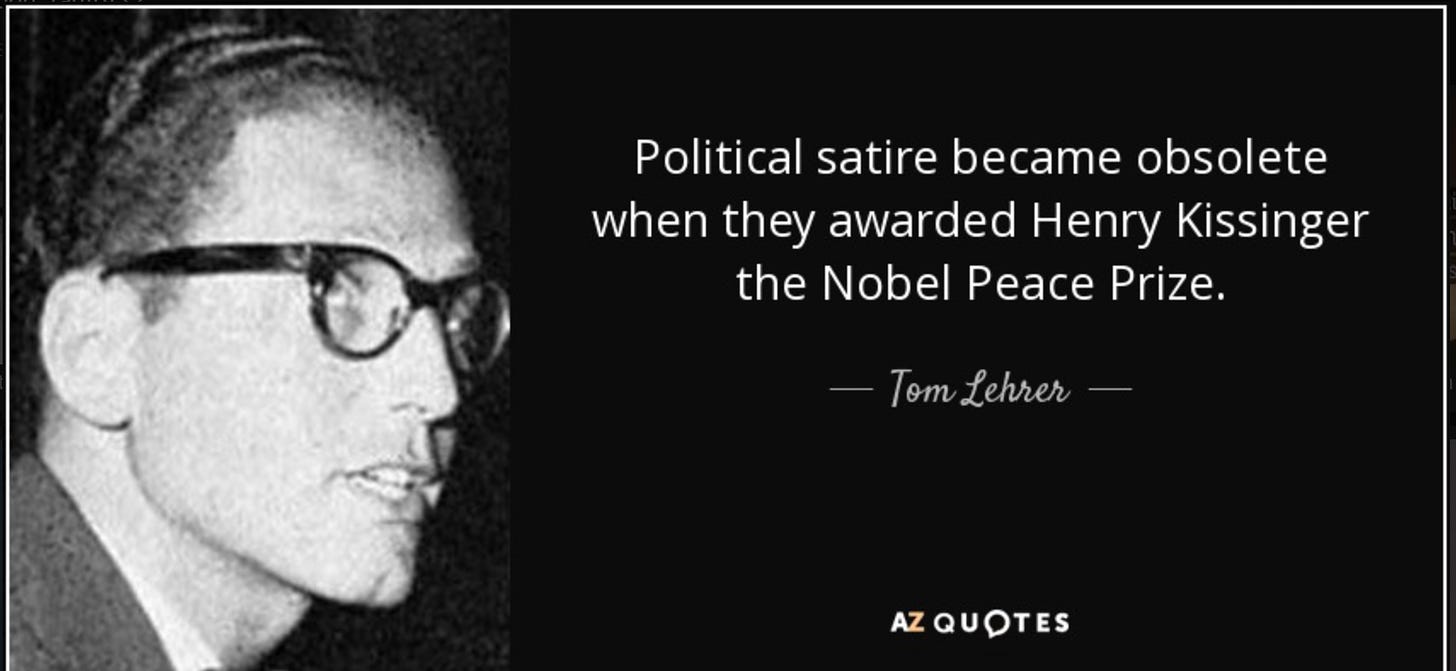Tom Lehrer's perfect epitaph for Henry Kissinger
The satirist said all one really needs to say about that ancient monster, and the official world that honored his great work for "peace"
That famous line comes from Todd Purdum’s piece (below) on Lehrer in the New York Times (whose James Reston defended Kissinger’s award in his op-ed column on 10/17/73, at https://www.nytimes.com/1973/10/17/archives/kissingers-nobel-prize-washington.html). (Kissinger shared the prize with North Vietnam’s Le Duc Tho, the two having negotiated an uneasy peace in Vietnam.)
For a nuanced little history (albeit a deeply slanted one) of that notorious award, and Kissinger’s response to it, see Jay Nordlinger’s retrospective in today’s National Review, at https://www.nationalreview.com/corner/the-1973-nobel/.
And as a corrective to Nordlinger’s bias in Kissinger’s favor (dictated by the magazine’s unchanged position on the US war in Vietnam), see Bevan Hurley’s overview in today’s Independent (UK):
From Cambodia to Bangladesh: a brief history of Henry Kissinger’s alleged war crimes
November 30, 2023
https://www.independent.co.uk/news/world/americas/henry-kissinger-war-crimes-cambodia-b2456372.html
Those with the time and inclination may also want to read Christopher Hitchens’ The Trial of Henry Kissinger, Roger Morris’s Uncertain Greatness: Henry Kissinger and US Foreign Policy and Seymour Hersh’s The Price of Power: Kissinger in the Nixon White House.
And to those especially concerned about the ongoing worldwide depopulation drive, I strongly recommend a reading of NSSM 200, which Kissinger devised (at least ostensibly) on Nixon’s orders (though the impetus was more likely to have come from the Rockefellers, Kissinger’s true patrons all along). This document spells out the necessity of making Third World depopulation an official goal of US foreign policy: https://nssm200.com/
Let me conclude by stressing the notoriety of Kissinger’s Nobel Peace Prize in 1973—and how deeply things had changed by 2009, when Barack Obama got the prize. Although that too was controversial, it was less so than Kissinger’s award—and far less controversial than it ought to have become, as we can safely say in retrospect, considering Obama’s bloody legacy of “peace,” which makes Bush/Cheney look like two hard-edged peaceniks.
MUSIC; Still a Sly Wit, Now Mostly for Himself
by Todd Purdum
July 16, 2000
His songs are the stuff of your fondest adolescent imagination, subversive send-ups of the Boy Scouts, religion, college cheerleading, pollution, plagiarism, prudishness. They are twisted, erudite parodies of the perverse: a necrophiliac's love song, a ''Masochism Tango,'' a nuclear military march. Acid attacks on political expedience: '' 'Once the rockets are up, who cares where they come down? That's not my department,' says Wernher von Braun.''
So it is a bit of a surprise on meeting Tom Lehrer, the Harvard-trained mathematician-cum-musician whom the disc jockey Barry Hansen has called ''the most brilliant song satirist ever recorded,'' to learn that he seems a lot more like the gently whimsical voice behind his children's songs for the television series ''The Electric Company'' (about adverbs, spelling and selfishness) than the sick-genius author of ''Poisoning Pigeons in the Park.''
Smiling, elfin, a bit stooped but slim and spry at 72, Mr. Lehrer is nothing so much as sweet. Oh sure, he confesses to still composing such questionable ditties as ''Bye-bye, Baby'' (about ''partial-birth'' abortion), though now strictly to appall himself. He bemoans the decline of civility and grammar and the collapse of the unifying liberal political consensus that made his songs of the 50's and 60's seem daring and safely hilarious at the same time.
But he pines not at all for the performing career that made him a sensation in nightclubs and concert halls (his last major paid appearance was 33 years ago). He mourns not the muse that mostly seemed to desert him after Vietnam and assassinations and Watergate made it harder to be funny about serious things. Or, as he once put it: ''Political satire became obsolete when Henry Kissinger was awarded the Nobel Peace Prize.''
The rest is at https://www.nytimes.com/2000/07/16/arts/music-still-a-sly-wit-now-mostly-for-himself.html






I thought Anthony Bourdain's sentiments about Henry Kissinger was perfect:
"Once you’ve been to Cambodia, you’ll never stop wanting to beat Henry Kissinger to death with your bare hands. You will never again be able to open a newspaper and read about that treacherous, prevaricating, murderous scumbag sitting down for a nice chat with Charlie Rose or attending some black-tie affair for a new glossy magazine without choking. Witness what Henry did in Cambodia – the fruits of his genius for statesmanship – and you will never understand why he’s not sitting in the dock at The Hague next to Milošević."
It's a sad thing when you see a man's death and all you can think is "What took you so long, you miserable bloody bastard?"